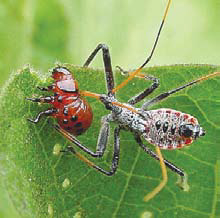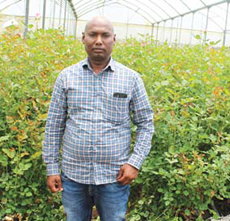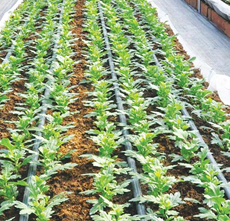 Intercontinental ocean shipping of agricultural products is considered more carbon and cost efficient and may provide more flexibility compared to air freight. The Kenyan government is actively supporting sea freight so that Kenya remains competitive in the global market. Although sea transport is already common practice for some Kenyan fruit (avocado, pineapple), for flower export, this option is still poorly explored.
Intercontinental ocean shipping of agricultural products is considered more carbon and cost efficient and may provide more flexibility compared to air freight. The Kenyan government is actively supporting sea freight so that Kenya remains competitive in the global market. Although sea transport is already common practice for some Kenyan fruit (avocado, pineapple), for flower export, this option is still poorly explored.
Kenya exports a significant amount of products to the Netherlands, most of which are related to agriculture. Globally the main mode of transport for trade is ocean shipping, this is however not the case for Kenya. Most of it is transported by air as this is a quicker form of transportation. For agricultural products with a short shelf life such as flowers, fruits and vegetables this is especially important. In 2020 however, COVID-19 exposed the limitations of airfreight in Kenya. Passenger flights carry freight in the belly of the plane and due to a high number of flights being cancelled there was a huge shortfall of airfreight capacity. By increasing maritime shipping, Kenya can provide an alternative way of transporting goods, decrease costs and reduce its environmental footprint.

 Our total membership represents about 80% of the global floriculture trade, so we have a good representation of the international market of cut flowers and potted plants. In our industry, it is important to have a collective voice that gives visibility to important topics, such as market access and sustainability,” explains Sylvie Mamias, Secretary General of Union Fleurs. The international floriculture trade association is based in Brussels, as one of its key roles is to represent the common interests of its members towards the EU institutions. “The impact of the start of the pandemic is a good illustration of our work. When such challenges arise, we are able to get the attention of governments and policymakers to make them aware of the specificities of this industry and channel support.” She adds
Our total membership represents about 80% of the global floriculture trade, so we have a good representation of the international market of cut flowers and potted plants. In our industry, it is important to have a collective voice that gives visibility to important topics, such as market access and sustainability,” explains Sylvie Mamias, Secretary General of Union Fleurs. The international floriculture trade association is based in Brussels, as one of its key roles is to represent the common interests of its members towards the EU institutions. “The impact of the start of the pandemic is a good illustration of our work. When such challenges arise, we are able to get the attention of governments and policymakers to make them aware of the specificities of this industry and channel support.” She adds The Kenya Plant Health Inspectorate Service is training experts to help detect a new invasive mango mealybug pest.
The Kenya Plant Health Inspectorate Service is training experts to help detect a new invasive mango mealybug pest. Brussels based multi-stakeholder initiative the Floriculture Sustainability Initiative (FSI) new and more stringent environmental and social criteria for producers was introduced. This criterion entailed enhancing the scope of the FSI Basket of Standards.
Brussels based multi-stakeholder initiative the Floriculture Sustainability Initiative (FSI) new and more stringent environmental and social criteria for producers was introduced. This criterion entailed enhancing the scope of the FSI Basket of Standards. “Trade rules tend to be taken for granted. However, without rules, there would be mayhem. A trading system that is based on rules helps ensure that flower trade flows as smoothly, predictably, and freely as possible.” The World Trade Organization recently posted a video in which they focus on rules-based trade in the floriculture industry. In her recent LinkedIn post, Sylvie Mamias, Secretary General of the international floriculture trade association Union Fleurs, discusses the importance of WTO’s focus on floriculture trade.
“Trade rules tend to be taken for granted. However, without rules, there would be mayhem. A trading system that is based on rules helps ensure that flower trade flows as smoothly, predictably, and freely as possible.” The World Trade Organization recently posted a video in which they focus on rules-based trade in the floriculture industry. In her recent LinkedIn post, Sylvie Mamias, Secretary General of the international floriculture trade association Union Fleurs, discusses the importance of WTO’s focus on floriculture trade. Freight, the taxation regime, and the EU plant health regulation were predicted to be the biggest challenges for the Kenyan floriculture in 2021, according to Kenya Flower Council’s (KFC) CEO Clement Tulezi. “When I was predicting that earlier in the year, I was not wrong. These three have remained the major challenges, and not much has changed since, unfortunately.” In this article, Tulezi goes over the current state of these challenges, as well as a new challenge the Kenyan flower industry is having to deal with and how Tulezi’s association is helping to find solutions and improvements.
Freight, the taxation regime, and the EU plant health regulation were predicted to be the biggest challenges for the Kenyan floriculture in 2021, according to Kenya Flower Council’s (KFC) CEO Clement Tulezi. “When I was predicting that earlier in the year, I was not wrong. These three have remained the major challenges, and not much has changed since, unfortunately.” In this article, Tulezi goes over the current state of these challenges, as well as a new challenge the Kenyan flower industry is having to deal with and how Tulezi’s association is helping to find solutions and improvements. Insect monitoring forms an important part of integrated pest management programmes. It is crucial to identify pests accurately so that appropriate control measures can be taken. Insect traps are one way of observing the prevalence of insects.
Insect monitoring forms an important part of integrated pest management programmes. It is crucial to identify pests accurately so that appropriate control measures can be taken. Insect traps are one way of observing the prevalence of insects. On the shores of Lake Naivasha, off North Lake Road in Kasarani area of Naivasha in Nakuru County lies a magnificent, well maintained farm with landmark, conspicuous greenhouses. Shalimar Flower Farm, a hotbed of horticulture thriving in Avocado and cutflower growing.
On the shores of Lake Naivasha, off North Lake Road in Kasarani area of Naivasha in Nakuru County lies a magnificent, well maintained farm with landmark, conspicuous greenhouses. Shalimar Flower Farm, a hotbed of horticulture thriving in Avocado and cutflower growing. Fertigation is a widely used farming practice. The fertigation technique allows growers to save time, resources, and efforts by completing two events at a time: fertilization and irrigation. Customization of modern fertigation systems and innovative satellite-based software enable pinpoint variable rate fertilizer (VRF) applications. The most efficient method is drip fertigation that reduces inputs and delivers nutrients to the root zone. The technology is suitable for farm enterprises of any size since there are large and small-scale fertigation systems, with manual or fully automated control.
Fertigation is a widely used farming practice. The fertigation technique allows growers to save time, resources, and efforts by completing two events at a time: fertilization and irrigation. Customization of modern fertigation systems and innovative satellite-based software enable pinpoint variable rate fertilizer (VRF) applications. The most efficient method is drip fertigation that reduces inputs and delivers nutrients to the root zone. The technology is suitable for farm enterprises of any size since there are large and small-scale fertigation systems, with manual or fully automated control. When it comes to talking about disease-related issues in greenhouse crops, one point of confusion is often WHICH pathogens CAN be transmitted by water. Some are obvious – we all know Pythium is water-borne. But what about other culprits, like Fusarium or Erwinia? Should you worry about these in your recirculating water?
When it comes to talking about disease-related issues in greenhouse crops, one point of confusion is often WHICH pathogens CAN be transmitted by water. Some are obvious – we all know Pythium is water-borne. But what about other culprits, like Fusarium or Erwinia? Should you worry about these in your recirculating water?